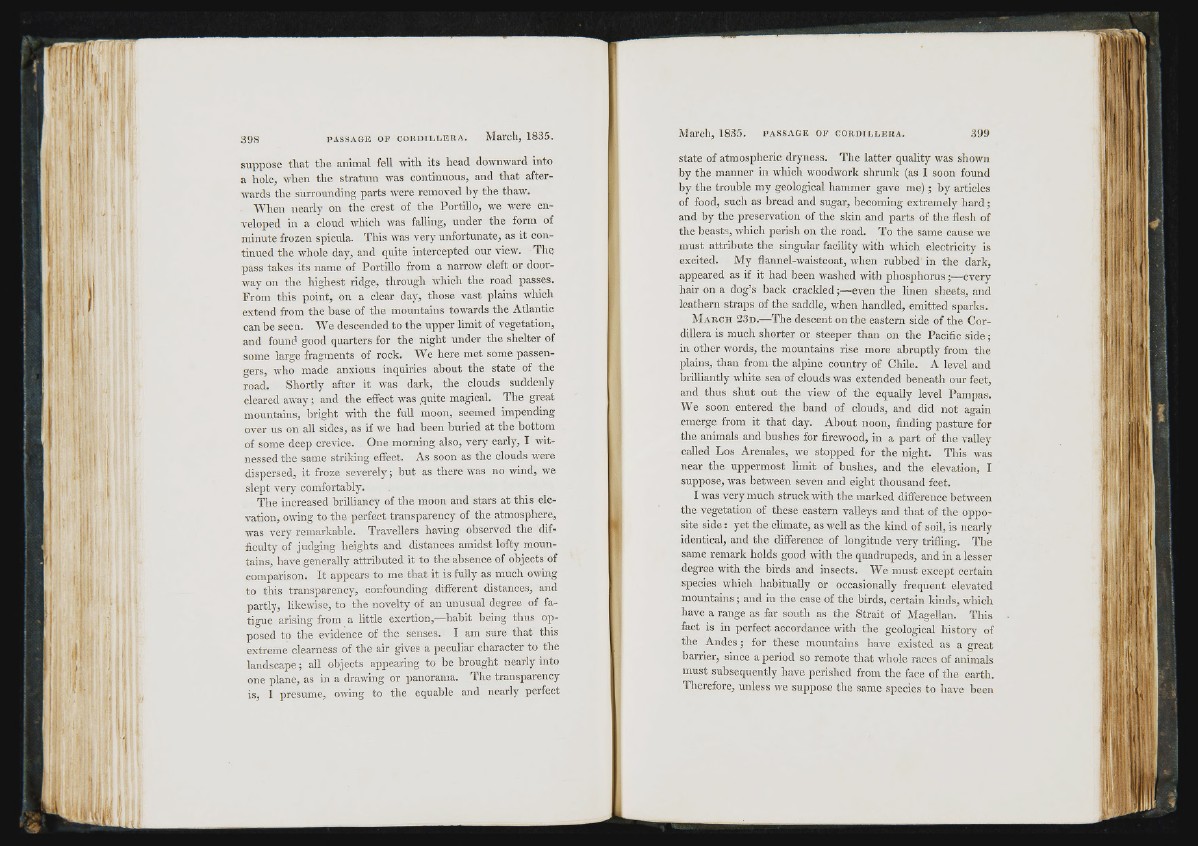
riti
suppose that the animal fell with its head downward into
a hole, when the stratum was continuous, and that afterwards
the surrounding parts were removed by the thaw.
When nearly on the crest of the Portillo, we were enveloped
in a cloud which was falling, under the form of
minute frozen spicula. This was very unfortunate, as it continued
the whole day, aud quite intercepted our view. The
pass takes its name of Portillo from a narrow cleft or doorway
on the highest ridge, through which the road passes.
From this point, on a clear day, those vast plains which
extend from the base of the mountains towards the Atlantic
can be seen. We descended to the upper limit of vegetation,
and found good quarters for the night under the shelter of
some large fragments of rock. We here met some passengers,
who made anxious inquiries about the state of the
road. Shortly after it was dark, the clouds suddenly
cleared away; and the effect was quite magical. The great
mountains, bright with the full moon, seemed impending-
over us on all sides, as if we had been buried at the bottom
of some deep crevice. One morning also, very early, I witnessed
the same striking effect. x\s soon as the clouds were
dispersed, it froze severely; but as there was no wind, we
slept very comfortably.
The increased brilliancy of the moon and stars at this elevation,
owing to the perfect transparency of the atmosphere,
was very remarkable. Travellers having observed the difficulty
of judging heights and distances amidst lofty mountains,
have generally attributed it to the absence of objects of
comparison. It appears to me that it is fully as much owing
to this transparency, confounding different distances, and
partly, likewise, to the novelty of an unusual degree of fatigue
arising from a little exertion,—halnt being thus opposed
to the evidence of the senses. I am sure that this
extreme clearness of the air gives a peculiar character to the
landscape; all objects appearing to be brought nearly into
one plane, as in a drawing or panorama. The transparency
is, I presume, owing to the equable and nearly perfect
state of atmospheric dryness. The latter quality was shown
by the manner in which woodwork shruidc (as I soon found
by the trouble my geological hammer gave me) ; hy articles
of food, such as bread and sugar, becoming extremely hard;
and by the preservation of the skin and parts of the flesh of
the beasts, which perish on the road. To the same cause we
must attribute the singular facility with which electricity is
excited. My flannel-waistcoat, when rubbed in the dark,
appeared as if it had been washed with phosphorus;—every
hair on a dog’s back c r a c k le d e v e n the linen sheets, and
leathern straps of the saddle, when handled, emitted sparks.
M a r c h 2 3 d .— The descent on the eastern side of the Cordillera
is much shorter or steeper than on the Pacific sid e ;
in other words, the mountains rise more abruptly from the
plains, than from the alpine country of Chile. A level and
brilliantly white sea of clouds was extended beneath our feet,
and thus shut out the view of the equally level Pampas.
We soon entered the band of clouds, and did not again
emerge from it that day. About noon, finding pasture for
the animals and bushes for firewood, in a part of the valley
called Los Arenales, we stopped for the night. This was
near the uppermost limit of bushes, and the elevation, I
suppose, was between seven and eight thousand feet.
I was very much struck ivith the marked difference betiveen
the vegetation of these eastern valleys and that of the opposite
side : yet the climate, as well as the kind of soil, is nearly
identical, and the difference of longitude very trifling. The
same remark holds good with the quadrupeds, and in a lesser
degree with the birds and insects. We must except certain
species ivhich habitually or occasionally frequent elevated
mountains; and in the case of the birds, certain kinds, which
have a range as far south as the Strait of Magellan. This
fact is in perfect accordance with the geological history of
the Andes; for these mountains have existed as a great
barrier, since a period so remote that whole races of animals
must subsequently have perished from the face of the earth.
Therefore, unless we suppose the same species to have been
jt-i